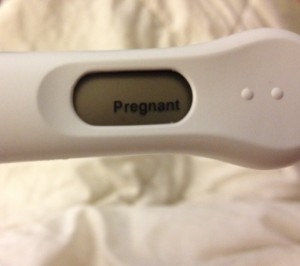 Cancer during pregnancy is rare, occurring in approximately one out of every 1,000 pregnancies, with breast cancer being the most commonly diagnosed. In the past, both healthcare providers and women were often unclear about how to proceed with a pregnancy after a cancer diagnosis without jeopardizing either the mother or the fetus; however, as more women with cancer are deciding to start or continue cancer treatment while pregnant, more information about treating and living with cancer during pregnancy is available. Oncofertility Consortium member Eileen Wang, MD, an OB/GYN who specializes in maternal fetal medicine (MFM) provides an overview of the management of women who are diagnosed with cancer during pregnancy in, “Pregnancy in Cancer Patients and Survivors,” a chapter in Oncofertility Medical Practice: Clinical Issues and Implementation.
Cancer during pregnancy is rare, occurring in approximately one out of every 1,000 pregnancies, with breast cancer being the most commonly diagnosed. In the past, both healthcare providers and women were often unclear about how to proceed with a pregnancy after a cancer diagnosis without jeopardizing either the mother or the fetus; however, as more women with cancer are deciding to start or continue cancer treatment while pregnant, more information about treating and living with cancer during pregnancy is available. Oncofertility Consortium member Eileen Wang, MD, an OB/GYN who specializes in maternal fetal medicine (MFM) provides an overview of the management of women who are diagnosed with cancer during pregnancy in, “Pregnancy in Cancer Patients and Survivors,” a chapter in Oncofertility Medical Practice: Clinical Issues and Implementation.
Pregnancy can often delay a cancer diagnosis because some cancer symptoms, such as fatigue, nausea, or anemia, are common during pregnancy and are not considered suspicious. On the other hand, pregnancy can sometimes uncover cancer that has previously gone undetected. For example, a Pap test done as part of standard prenatal care can detect cervical cancer. Similarly, an ultrasound performed during pregnancy can find ovarian cancer that might otherwise go undiagnosed. According to Dr. Wang, “Once a woman receives a diagnosis of cancer during pregnancy, this should trigger a multidisciplinary approach to her care.”
When making treatment decisions for cancer during pregnancy, health care providers should consider the best treatment options for the mother and the possible risks to the developing fetus. The type of treatment chosen depends on many factors, including the stage of the pregnancy; the type, location, size, and stage of the cancer; and the wishes of the expectant mother and her family. Some cancer treatments can harm the fetus, especially during the first trimester, so treatment may be delayed until the second or third trimesters. When cancer is diagnosed later in pregnancy, doctors may wait to start treatment until after the baby is born, or they may consider inducing labor early. In some cases, such as early-stage cervical cancer, doctors may wait to treat the cancer until after delivery.
The prognosis for a pregnant woman with cancer is often the same as other women of the same age with the same type and stage of cancer; however, if a woman’s diagnosis or treatment is delayed during pregnancy, the extent of the cancer may be greater. In addition, because of the amount of hormones produced during pregnancy, they have the potential to affect the growth and spread of some types of cancer. Dr. Wang concludes, “A multidisciplinary approach involving the patient and her support network, the oncology and surgery teams, and the obstetrical and MFM team is required to give the patient the best medical counseling and care and to manage her expectations during the pregnancy regarding her future child in the context of treatment and prognosis.” Read “Pregnancy in Cancer Patients and Survivors.”

